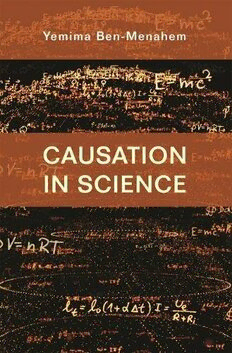
Causation in Science PDF
Preview Causation in Science
Causation in Science Causation in Science Yemima Ben- Menahem Princeton University Press Princeton & Oxford Copyright © 2018 by Princeton University Press Requests for permission to reproduce material from this work should be sent to Permissions, Princeton University Press Published by Princeton University Press, 41 William Street, Princeton, New Jersey 08540 In the United Kingdom: Princeton University Press, 6 Oxford Street, Woodstock, Oxfordshire OX20 1TR press.princeton.edu All Rights Reserved ISBN 978-0-691-17493-8 Library of Congress Control Number: 2018932375 British Library Cataloging- in- Publication Data is available This book has been composed in Arno Pro Printed on acid- free paper. ∞ Printed in the United States of America 10 9 8 7 6 5 4 3 2 1 In memory of my parents Elizabeth and Joseph Goldschmidt Contents Preface ix Acknowledgments xiii 1 From Causal Relations to Causal Constraints 1 2 Determinism and Stability 35 3 Determinism and Stability in Physics 61 4 Determinism and Locality 82 5 Symmetries and Conservation Laws 105 6 The Principle of Least Action: From Teleology to Causality 134 7 Causation and Reduction 158 References 183 Index 193 vii Preface The concepts of truth and causation, generally taken for granted in daily discourse, have engaged philosophers throughout his- tory. With regard to both these concepts, the disparity between appear- ance and reality, and the difficulty of clearly delineating one from the other, threaten to subvert the uncritical stance of common sense. More- over, in discourse about causation, as in discourse about truth, human language, with its categories, descriptions, ambiguities, and metaphors, seems to stand in the way of an objective, mind- independent grasp of reality. This obstacle, though recognized by earlier philosophers, came to the fore at the turn of the twentieth century, when developments in logic, mathematics, science, and philosophy converged into the philo- sophical orientation known as the “linguistic turn.” Radical manifesta- tions of the concern about language’s role in epistemology went so far as to call for the rejection of truth and objectivity, and their replacement by notions such as definitions, conventions, fictions, and narratives. This linguistic challenge to truth (the subject of my Conventionalism) will not concern us here. The linguistic turn is also evident in twentieth- century philosophy’s focus on the theory of meaning in general, and on the meanings of cer- tain core concepts, such as causation, explanation, virtue, and liberty. The importance of these meaning- oriented projects notwithstanding, in the case of causation, the ongoing debates about its definition have diverted attention from other issues, and in particular, from the various ways in which causal notions function in contemporary science. Atten- tion to scientific practice led me to the conclusion that the notion of causal constraint is far more germane than that of causal relations be- tween individual events. This book is therefore structured around a fam- ix
